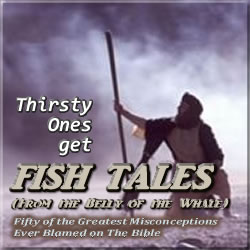The Holy Spirit and the Divine Feminine
Questions Concerning the Female Component of the Godhead
ABSTRACT: Despite the well-known declaration of Scripture, that humans are created in the image of God, it has long been asserted by Western Protestantism that there is no feminine component to be found in the Godhead. But upon further review of two self-evident facts, a much different picture emerges: First, there is the most obvious reality that women—made in God’s image—comprise half of said human race and so this should shed light on the true nature of the Divine. And second, there are the words that biblical writers use, which reveal a further truth in light of the original languages of both The Old Testament and The New Testament…
AND GOD SAID, “LET US make mankind in Our image, according to Our likeness… male and female they were created.” (Genesis 1:26-27) So states The Bible, in no uncertain terms. But if that’s true, then we’d also have to believe that if Adam and Eve—which is to say, a man and a woman—were created in God’s image, then the Godhead should reflect this same division of the sexes—as in, male and female. Right? I mean, that train of thought does constitute a genuine sequence of logic, doesn’t it? At least it does based on the kind of logic I’m aware of.
Yet for some inexplicable reason, we’re told—again, in no uncertain terms—that The Bible itself, the alleged fountainhead of all divine wisdom, doesn’t follow suit in this matter.
But as so often happens in cases like this, I can’t help feeling like the bewildered child in Hans Christian Andersen’s fairy tale: The Emperor’s New Clothes. So many centuries have rolled by, so many thoughtful men and women have sought to further our knowledge of God’s word, and yet rarely, if ever, does anyone ever address the obvious inconsistency that insists there’s no feminine component in the Godhead. And by that I mean to say, when we’re told that God, the Father, and God, the Son, are both masculine, we’re also expected to believe that God, the Holy Spirit, is masculine as well.
Now immediately I can hear the protests of those who are always content to avoid questioning the traditions of the Church. But honestly, shouldn’t we, who love the God Who gave us The Bible, be concerned more with what it reveals than those traditions that continually plague a genuine understanding of it? And because I assume that many of you still reading this are concerned with what Scripture says, you’re also willing to do what I’d do if you were struck by the sneaking suspicion that something wasn’t quite right with what you were being told was the gospel truth.
So, with that in mind, let’s take some time to analyze the question: What does The Bible really say about the gender of the Spirit of God?
To begin with, let’s look at what we’ve all grown up with as being the conventional wisdom in this case. When it comes to this subject, the verses that speak most directly to our traditional understanding are in The Gospel of John. There we find the most explicit description of the Holy Spirit as being masculine, without even a hint—in the English language translations, at least—of there being any feminine component in the Godhead.
Said Jesus to His disciples:
If love Me, you’ll keep My commandments, and I’ll ask the Father, and He’ll give you another Comforter to be with you forever—the Spirit of Truth. The world cannot receive Him, because it neither sees Him nor knows Him. But you know Him, because He abides with you, and He will be in you… John 14:15-17
The only problem with referring to the Holy Spirit as “He” or “Him” is that when we read this passage in the Greek language, we find these words are never used as specific pronouns. In reality, they’re only inferred, much in the same way the Greek word aionios infers the meaning of “eternal” or “time-specific,” depending on the context in which it’s used.
To explain what I mean by that, consider Jesus’ statement: “I’ll ask the Father, and He’ll give you another Comforter.” In the Greek, “Father” is Patera, from the root word Pater, obviously a masculine noun. So, when the sentence goes on to say, “He’ll” give you another Comforter, even though the word “He” doesn’t exist as a pronoun in this sentence, in English it’s inserted so the sentence makes sense. But when Jesus refers to the Spirit, the Greek word is Pneuma, which is a neuter noun. Then, when the sentence goes on to say that the world is unable to see “Him” or know “Him,” the word in the Greek is Auto, a word that doesn’t carry with it a specific gender, and so can mean “he,” “she,” “it,” “himself,” “herself,” or “itself.” According to Strong’s Exhaustive Concordance, this word auto is “very often used rather laxly, where the subject or the object to which it’s referred is not expressly indicated, but must be gathered from some preceding name or from the context.”
From this, we see that when the Holy Spirit is referred to as “He” or “Him,” there’s something quite illogical in this translation, considering that the Greek word Pneuma, being a neuter noun, would call for the pronoun “It.” But obviously, in the interest of inserting a pronoun more in line with the flow of the conversation, which speaks of God and Jesus as persons, the translator chose to insert the personal pronoun “He” rather than the impersonal pronoun “It.”
Confronted by such a contradiction, the question is: If the linguistic context didn’t call for the Holy Spirit to be referred to as masculine, then what context did inspire the translator to describe the Spirit as such?
Story Continues Below
Says Richard Price—the founder and CEO of Academia.edu—on his podcast In Depth With Academia:
Fish Tales (From the Belly of the Whale): Fifty of the Greatest Misconceptions Ever Blamed on The Bible is:
To hear Price’s book review of Fish Tales (From the Belly of the Whale), CLICK HERE.
To hear Kent and Zen Garcia talk about correcting biblical misconceptions, from September 9th, 2021, CLICK BELOW.
Story Continues From Above
TO ANSWER THAT, we’d have to exit the world of linguistics and turn, instead, to that of history. But as I like to do, before doing so, let’s turn to what I believe provides a scriptural foundation for an understanding of the true gender of the Holy Spirit. And mind you, this view will look to not only Scripture but also that other great reservoir of spirituality, God’s own creation made in His image—that is, you and me. In other words, if other great misconceptions were neutralized by looking to our own hearts as a reflection of God’s nature in us, we should expect nothing less when it comes to looking at the image of God in all of us, which is to say, one comprised of both male and female components.
What’s more, this reflection of the male and female aspects of the Godhead isn’t exhibited in humankind alone. It permeates every sphere of life on Earth, from the highest primates down to the lowest invertebrates, even manifesting in the realms of insects and plants. So, when anyone thinks that just because God, Jesus, and the Holy Spirit are so far above it all, so much so that humanity and nature can’t be compared to their divine status, all we can do is seek refuge in the message of Scripture. And when we do, what are we to make of the Apostle Paul’s statement?
For since the creation of the world, God’s invisible qualities, His eternal power and divine nature, have been clearly seen, being understood from His workmanship, so that mankind is without excuse… Romans 1:20
So, to those who insist there’s no female component in the Godhead, can you explain why the term for “divine nature,” which Paul used here, is the Greek word theiotes? Obviously this word is derived from the root word theos for God, but what’s not so obvious is this word, which describes the nature of the Divine, just happens to be a feminine noun—not masculine, not neuter, but feminine.
But certainly this would come as no surprise to students of The Bible; and by that I mean, The Bible as a whole, because from its first descriptions of the Spirit of God in The Book of Genesis, this Spirit has been equated with the feminine aspect of the Godhead. “In the beginning, God created the Heavens and the Earth … and the Spirit of God moved upon the face of the deep.” (Genesis 1:1-2) The Spirit of God, said Moses; and what was the Hebrew word he used? It was Ruach Elohim, which is to say, Ruach, a feminine noun meaning Spirit, not masculine, and Elohim, which is to say, Gods, not God. Specifically, Elohim—God in the plural—created humanity in Their image, not His. Once again, the personal pronouns “His” and “He” aren’t in the original Hebrew. They’ve been added by the translator. What the Scriptures are really saying is:
Then “Gods” said, let Us make humanity in Our image, according to Our likeness. So “Gods” created humanity in “Their” image .. male and female, “They” created them… Genesis 1:26-27
And just why do you think the biblical translators inserted the word “God” instead of “Gods” when translating this name Elohim, which as any Hebrew scholar knows is the plural form of El? Why naturally, it’s because of that other great pillar of Hebrew Scripture: “Hear, oh, Israel, our God is one God.” (Deuteronomy 6:4) Flying in the face of the other nations surrounding Israel, who were all steeped in polytheism, the Hebrew religion was unique among the nations because it was monotheistic.
It’s this cultural pressure, then, that forms the basis of why Christian translators, just as Hebrew translators of The Old Testament had before them, succumbed to the decision to portray the Holy Spirit differently from the way it had been before their translation of The New Testament.
More on this subject will come later, but for now, we need to complete our investigation into this earliest of biblical traditions, which clearly equates the Holy Spirit with the feminine aspect of the Godhead.
Other Old Testament passages that speak of the feminine aspect of the Spirit: “Then the Lord God formed man of the dust from the ground, and breathed into his nostrils the breath of life, and man became a living being.” (Genesis 2:7) The Hebrew word used here for “breath” is neshamah, a feminine noun—the Hebrew precursor to The New Testament word for the Spirit, Pneuma, used to translate the words for not only “spirit” and “wind” but also “breath.”
Then, in a verse that requires no knowledge of Hebrew to translate the feminine aspect of the words, we read:
Wisdom calls out in the street. She shouts in the public squares. From the top of the walls and the gateways of the city, she cries out… Proverbs 1:20-21
In this case, the Wisdom of God is portrayed as a living entity, Who, as the divine agency of the Godhead, functions in the same way that later Christian theology will equate with the primary function of the Holy Spirit.
Echoing this same idea is the prophet Nehemiah, who, speaking of God’s care of the Israelites in their fortyyear sojourn in the Wilderness, said: “You gave Your good Spirit to instruct them. You didn’t withhold Your manna. You gave them water for their thirst.” (Nehemiah 9:20) And when the psalmist cried, “Where can I go to escape Your Spirit? Or where can I flee to avoid Your presence?” (Psalm 139:7) the same word Ruach is used for the Spirit of God.
At various times, the Spirit of God was said to have come upon Moses, Joshua, David, Jephthah, Samson, Elijah, Elisha, Isaiah, Ezekiel, Daniel, Micah, and Zechariah. And in each and every case, the word used for the Spirit Who came upon them all was the same: Ruach. (Numbers 11:17; 27:18; Second Samuel 23:2; Judges 6:34; 11:29; 14:6, 19; First Kings 18:12; Second Kings 5:26; Isaiah 48:16-17; Daniel 4:8-9; Micah 3:8; Second Chronicles 24:20)
So, considering all the evidence in The Old Testament, verifying the Holy Spirit as being the feminine component of the Godhead, what could’ve created such an about-face with The New Testament writers? Are we to assume that some unique aspect of the Advent of Christ triggered this change in how we’re now supposed to view the Holy Spirit?
TO FIND OUT, let’s turn to those New Testament passages that reveal what Jesus said about this matter. After all, when it comes to the question of divine gender, who else can give us a more accurate “insider’s view” than the Son of God Himself? This is especially true, considering that the theologians who insist the Holy Spirit isn’t feminine fall into two camps.
The first camp claims that God is so far above His creation, He can’t even be said to have a gender. So, when God, as Infinite Spirit, attaches to “Himself” the idea of “maleness,” as an anthropomorphic attribute, He’s only doing this for the sake of human understanding. Based on this assumption, then, that God, the Father, isn’t actually masculine, it’d be just as presumptuous to view the Holy Spirit as being feminine.
Then, according to the second camp, portraying the Holy Spirit as anything other than an “it” is theologically unsound because, in their view, the Holy Spirit isn’t even part of the Godhead. To them, the so-called “Trinity” is unscriptural, and therefore the Holy Spirit can’t be addressed as a person at all. Thus, having been stripped of any semblance of personhood, the Holy Spirit is reduced to being a mere agent for good on God’s behalf, and so should only be spoken of impersonally.
Of course, that’s why, I insist, only what Jesus tells us about this subject can provide an antidote for such—dare I say—nonsense.
Based on the gospel record, then: Is there any evidence that suggests Jesus thinks the Godhead is such an abstract force that He’s humoring us when He speaks of God as His Father? And if so, does this mean there’s also evidence that Jesus views the Holy Spirit as being a similarly impersonal force? Said Jesus to His disciples:So, within the space of just ten verses, Jesus referred to God as the Father nine times. In all, He referred to God as the Father more than one hundred times in John’s Gospel and some sixty-five times in the Synoptic Gospels. Based on that count, then, either Jesus told us the truth about God over one hundred and sixty-five times or He fudged the truth over one hundred and sixty-five times, all because He didn’t have the heart to break the bad news to us. The One Who was born into the world with the express purpose of testifying to the truth didn’t really want to tell us Moses was misrepresenting the Lord when he said humans were made in God’s image. Instead, we’re supposed to believe that Jesus was telling us that God was our Father in the same way that adults fudge the truth about things children are incapable of understanding, like when we tell them storks bring babies home because they can’t bear to hear the truth about how it really happens. In other words, Jesus told us a little white lie.“In My Father’s house are many mansions. If it weren’t true, I’d have told you…”
Then, Philip said to Him, “Lord, show us the Father, and that will be enough for us.”
And Jesus replied, “Don’t you know Me, Philip? Have I been with you this long, and still you ask Me that? Whoever has seen Me has seen the Father, so why would you say to Me, ‘Show us the Father.’ Don’t you believe that I’m in the Father, and that He’s in Me? And I’ll do whatever you ask in My Name so the Father may be glorified in the Son…
“And anyone who loves Me will obey My teaching. My Father will love them, and We’ll come to them and make Our home with them. Anyone who doesn’t love Me won’t obey My teaching. These words you hear aren’t My own, but they belong to the Father Who sent Me.
“All this I’ve spoken while I’m still with you, but the Advocate, the Holy Spirit, Whom the Father will send in My Name, will teach you all things, and will remind you of everything I’ve told you…” John 14:2, 8-10, 13-14, 23-26
I mean, just think about it: Here we’ve waited century upon century for the Word of God to incarnate, to grow up, and to begin His teaching ministry. His clearly stated purpose was to testify to the truth, and just when He had His big chance to fulfill that high calling, He fudged it. At least that’s what the theologians who insist that Scripture merely anthropomorphizes the Godhead would have us believe.
So, if these theologians are correct in viewing God as Infinite Spirit and therefore utterly impersonal by nature, then can you imagine the look on Jesus’ face when Philip asked Him to show them the Father?
Picture it, if you can. In that moment, when Jesus could’ve told Philip the “truth”—that is, according to the Gospel of the Infinite God of Impersonal Reality—He told them: “If you’ve seen Me, you’ve seen the Father!” So, based on the theory of those who insist God, Jesus, and the Holy Spirit are so infinite They’re impersonal by nature, Jesus flat-out lied when He described Them as being otherwise. And He especially lied when He insisted He was in the Father, and the Father was in Him!
But, I, for one, don’t think He lied at all. I think He told us the truth, the whole truth, and nothing but the truth so help Him God. And I do so because, unlike all those who love to strain out gnats and swallow camels, Jesus was willing to die for what He believed. He was willing to die for what He told us to be true. And He was willing to do so rather than fudge the truth, which He said didn’t come from Him but, instead, came straight from His Father. So to Hell with anyone who’d suggest otherwise. I prefer to hitch my wagon on the Way, the Truth, and the Life. I prefer to go with Jesus on this one.
In doing so, we’d also have to accept that if Jesus told us that God is our Father, then it’s not too difficult, based on what we now know of the biblical portrayal of the Holy Spirit’s—dare I say—femininity, to understand what was really being said in Genesis:
Then Gods said, let Us make mankind in Our image, according to Our likeness. So Gods created mankind in Their image … male and female, They created them.
I mean, really, how blind can you be not to see the obvious in light of all we’ve outlined? What is it again?
Let’s see: God, the Father… Jesus, the Son… Gods, not God, creating mankind in Their Own image… Mankind created as male and female… All of creation, for that matter, from the highest primates to the lowest invertebrates, even insects and plant life, created as male and female… And finally, the Holy Spirit, as Comforter and Advocate, an equal member of the Godhead…
Hmmm, let’s see. If all this is true, then how could all of creation have been accomplished through the agency of only God, the Father, and Jesus, the Son? Pardon me for asking the obvious: If there’s a Divine Father and a Divine Son, then where the heck is the Divine Mother? Or should I say: Pardon me for asking a question so obvious that it would only occur to that bewildered child looking at some naked emperor, strutting about as everyone in the kingdom pretended to admire him as if he were wearing new clothes.
And by analogy, what I mean is, even though a child isn’t sophisticated enough to know where babies come from, they’re at least intelligent enough to know that whenever children are involved, a daddy and a mommy are involved. And the fact that children can understand something so basic about the human condition means that adults are clearly as knowledgeable when it comes to perceiving the reality of the Holy Spirit as the Mother of all creation in union with God, the Father, and Jesus, the Son.
SO, NOW THAT WE’VE GATHERED a great many facts from the biblical record to help solve this mystery, we’re in a much better position to appreciate the following details contained in the historical record. The first thing we need to remember is how the translators of The Old Testament wrestled with translating the Name of God, where He was spoken of as El, singular, and as Elohim, plural. And so, in their honest, though ill-advised, effort to differentiate the monotheistic nature of Hebraism from all other polytheist religions, they translated the Hebrew word Elohim as “God” instead of “Gods.”
In a classic case of history repeating itself, a similar situation reared its ugly head when New Testament writers were faced with the task of trying to communicate the truth about the Holy Spirit’s gender. In this instance, I’m talking about the fledgling Church’s attempt to differentiate itself from one of the most formidable contenders to first-century orthodox Christianity. I’m talking about Gnosticism—a theology embraced by a thriving community of believers who, in addition to possessing manuscripts which were viewed as being part of orthodox Scripture, also held to a wide range of other Gospels that vied for the attention of the saints.
Without going into too much detail as to why Gnosticism was correctly considered a threat, suffice it to say, there were, as with all great misconceptions, which Gnosticism could be so categorized, points of theology that were worth considering, whereas most of them clearly were not.
Among the Gnostics’ more questionable doctrines was their rejection of Christ’s humanity in favor of seeing His Advent on Earth as being one of pure spirit. Accordingly, they rejected the possibility that the resurrection of Christ was a genuine historical event, because if Jesus were not human, then the events surrounding the so-called “resurrection” were merely symbolic and not in fact genuine. This more than anything else was why orthodox Christianity vehemently opposed Gnosticism.
Unfortunately, opposing Gnosticism also meant opposing many of the manuscripts that supported their views, among them The Gospel of Thomas. Containing the so-called “secret sayings of Jesus,” Thomas not only echoed many sayings in the accepted texts, but it also provided provocative details that lent themselves to the idea of the feminine aspects of the Deity.
Said Jesus, according to Thomas:
Whoever doesn’t hate his father and his mother, as I do, cannot become My disciple. And whoever doesn’t love his father and his mother, as I do, cannot be My disciple… But My true Mother gave Me life… The Gospel of Thomas 101
So, in throwing out texts like The Gospel of Thomas, whatever potential they might have held for upholding this ancient view of the Holy Spirit as the Mother of Christ was quietly swept under the rug of hidden history.
Of course, in laying blame for the rejection of such thinking on the door of Gnosticism alone would prove to be just as shortsighted as those Gnostics who refused to embrace the tenants of orthodox Christianity.
Truth be told, the other driving force that added to the resistance of the reality of the feminine nature of the Divine is something that’s always clouded humanity’s thinking. That other opposing factor is the idea that sin, and therefore death, came as the result of the actions of the first woman—in fact, the mother of us all—Eve.
Since the earliest days of humanity, there’s been a distinctly schizoid attitude toward women. Whereas all cultures revered the role of women because of their nurturing, loving maternal aspects, there’s also been an equal and opposite reaction borne of envy, fear, and self-loathing on the part of men. And never more so in the hands of those men who, in direct opposition to the totality of its message, claim The Bible provides proof of women’s negativity. But to do that, men have had to severely distort the truth of Scripture in their war with women.
Naturally, they point to that earliest scenario where Eve first ate the Forbidden Fruit. In the process, though, they embrace a thoroughly selfish bias, which is clearly as one-sided as Adam’s himself. When questioned by God about why he was hiding among the fig trees, Adam took no responsibility for his own actions. Quite to the contrary, his instant and emphatic reaction was: “The woman You gave me, God, gave me the Fruit, and I ate!” (Genesis 3:12)
In this single statement are the seeds of an ancient war that rages to this day. Adam wasn’t man enough to confess his own inadequacy in the equation. According to him, it was either the women’s fault for talking him into eating the Fruit, or it was God’s fault for providing the woman in the first place. So began, at that very moment, man’s war with both women and God, which is why even such luminaries among the Church Fathers, one Augustine, wrote with all sincerity—misguided though he was:
What’s the difference, whether it’s in a wife or in a mother, it’s still Eve, the temptress, we must beware of in any other woman.
And to think: A pillar of the Church proudly proclaimed those words. Yet in light of the truth of Scripture, they’re nothing more than the misogynistic ravings of a man who clearly rejects the message of a true apostle of Christ, who emphatically rejected the notion that Eve should be blamed for the Fall of Mankind. Said Paul: “By one man sin entered the human race, and death by sin, and so death spread throughout all humanity.” (Romans 5:12)
And the reason Paul said this is because when we look to the total narrative of Scripture, we see that long before God provided Eve as a companion for Adam, He clearly stated the terms concerning the prohibition to eat from the Tree of Knowledge. By the time that eventful moment in history rolled around, the first man knew exactly what he was doing and consequently will forever bear the burden of his own actions—not God and not Eve.
What’s worse, not only have women suffered because of this kind of patriarchal manipulation of Scripture, but we now see how this same attitude of self-righteous smugness has infected a correct view of the Godhead. Furthermore, in gracefully enduring the consequences of such myopia, two things become all the more apparent in this timeless struggle.
Just as women have revealed the truth of their character by suffering injustice with a dignity that could only come from a God Who endured a similar travesty at Calvary, we detect a parallel regarding the mischaracterization of the Holy Spirit. And only because the Spirit of God can rightly be viewed as the Mother of creation could She—pardon me for inserting that forbidden pronoun here—have ever endured what only a mother can endure, until finally She receives her due credit for being the most faithful, loving, and gracious Mother of all.








